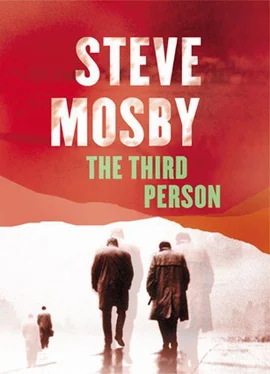Steve Mosby - The Third Person
Здесь есть возможность читать онлайн «Steve Mosby - The Third Person» весь текст электронной книги совершенно бесплатно (целиком полную версию без сокращений). В некоторых случаях можно слушать аудио, скачать через торрент в формате fb2 и присутствует краткое содержание. Жанр: Триллер, на английском языке. Описание произведения, (предисловие) а так же отзывы посетителей доступны на портале библиотеки ЛибКат.
- Название:The Third Person
- Автор:
- Жанр:
- Год:неизвестен
- ISBN:нет данных
- Рейтинг книги:3 / 5. Голосов: 1
-
Избранное:Добавить в избранное
- Отзывы:
-
Ваша оценка:
- 60
- 1
- 2
- 3
- 4
- 5
The Third Person: краткое содержание, описание и аннотация
Предлагаем к чтению аннотацию, описание, краткое содержание или предисловие (зависит от того, что написал сам автор книги «The Third Person»). Если вы не нашли необходимую информацию о книге — напишите в комментариях, мы постараемся отыскать её.
The Third Person — читать онлайн бесплатно полную книгу (весь текст) целиком
Ниже представлен текст книги, разбитый по страницам. Система сохранения места последней прочитанной страницы, позволяет с удобством читать онлайн бесплатно книгу «The Third Person», без необходимости каждый раз заново искать на чём Вы остановились. Поставьте закладку, и сможете в любой момент перейти на страницу, на которой закончили чтение.
Интервал:
Закладка:
Actually, I didn’t know how Graham could bring himself to live this far into the centre, where everything was way too big, noisy and busy for me. The one thing I supposed he had going for him was that he lived quite far up, in one of the more prestigious apartment blocks, slightly west of dead centre. It was the kind of place where, if you opened the window, you were more likely to hear helicopters than cars, and they generally didn’t bother with adBoards that high up – most of the people who lived there invented either the campaigns or the products, and they wouldn’t want to take their work home with them. Can you imagine a twenty-four hour jingle? You’d go insane. Well, city centre life had never appealed to me anyway, but I figured I was in the minority. If they had money, it was where people naturally gravitated to: the best bars; the best theatres; the best restaurants. I mean, in some parts of the suburbs, city centre life was actively advertised, to keep you in line – keep you pointing in the right direction.
Graham had money, all right, and he was one of those vaguely unfocused people who, lacking any impetus of their own, tended to go with the crowd by default, and so it was natural he’d end up there eventually. But I looked at him sometimes, and I’d see this slight look of confusion on his face, as though he was nervous about going the whole hog and actually embracing the emotion he was feeling for what it really was: dissatisfaction. It’s a word you can hiss, and you should feel free to try. In their heart-of-hearts, everybody knows that the life-path is just another branded commodity these days, and that fact can bite you from time to time – when you’re looking around and thinking what’s next ? But everything you’ve been taught is telling you that there is nothing next: that you’ve hit the peak and now all you have left to do is balance.
A sad fact: nothing ever looks as good on you as it does in the catalogue. For a pound, you don’t get the juicy steak that’s beaming out of the adBoard at you like some kind of meaty ambrosia. You get a flat fucking burger in a miserable fucking bun. In life, as in fast-food chains.
I had to pass through one of the main shopping precincts to get to Graham’s building, and it was heaving with people. It always was on a Saturday. All those weekday-workers came out window-shopping. Couples went strolling. Kids hung out in baggy, coloured posses, with nothing to do and nowhere to go. And there was this genuinely unpleasant, slightly threatening undertone to everything. It was as though, despite the smiles and hum of conversation, at any moment somebody might buy something.
A few minutes’ walk took me to a quieter section of the city, where the canal snakes through at the edge. Graham’s building backed onto the canal, which is why the three lower floors remained entirely unoccupied. When the industrial skies open over winter, the abandoned canal overflows, filling nearby buildings to an admirable height and washing away any derelicts that have managed to squeeze in through the cracks. Of course, it doesn’t make any difference to the high-flyers on the floors above: for them, the canal is just this picaresque thing from another era; it’s no different to having an old, golden barometer on the wall, or a three-hundred-year-old wooden chest to put their dirty laundry in. When the banks flood, it just gets a few metres closer and they can see it better. That’s all.
The intercom on the front of the building looked like something you’d put a cigarette out on – and, if you did, it probably wouldn’t have left a mark. Cars shot past behind me as I tapped in seventeen-twelve and in the pause that followed, I turned and looked around. Busy road. Perfectly-styled park over the other side. A deli further up, painstakingly recreated. There was probably even a nice little church around here somewhere: a church without a door. When we were teenagers, Graham had told me: life’s just a lot of fakery and bullshit, and I hate it . What had happened to my friend?
I heard the voice come out of the intercom and turned back.
‘Hello?’
His voice, and yet not. All the intercoms in the city centre sound exactly the same: it’s a lightly amplified, disguised male voice. Imagine a vaguely pissed off robot. For all I knew, it was Helen answering the door, but I took a gamble that it wasn’t.
‘Gray,’ I said, leaning in. ‘It’s Jason.’
A pause.
‘Hijay.’ Our old amalgamated greeting told me it was him. ‘Come on up. Wait; hang on.’
The intercom was muffled for a few seconds. I could hear that he was talking to Helen, but couldn’t make out the actual words. Of course, I didn’t really need to.
A moment later, the intercom cleared.
‘Come on up.’
The latch on the steel door buzzed loudly for a couple of seconds, as though in warning, and then clicked open. I pushed it and went inside, and was immediately hit by the smell of fresh pot-pourris that filled the stairwell. This was such a nice apartment block.
The elevator was already on its way down for me. I waited for it to arrive, already sure that this was going to be a tense morning.
A couple of picture portraits.

Those are the facts – but even there they’ve come out uneven, because the facts about Helen are more difficult to pin down. Nobody would ever deny the things I’ve said about Graham – what you see is what you get – but Helen’s a far more subjective prospect: it’s difficult to pin down anything concrete and personal about her, because she’s totally absorbed in the relationship.
Certain things are true, of course. She is small (five foot) and thin (probably about seven stone), and she does have clear skin, in the same way that a baby has a clear conscience; these aren’t things she’s ever had to work at. In fact, she’s never had to work at anything, as far as I know. Her parents are both very rich and very protective: a lethal combination. They paid her way through University, and then supported her for a while afterwards, all the time assuming that their investment in her gave them overall control on any decisions she had to make. If you wanted to see Helen as a company, you might see her parents as two silent partners who between them have the casting vote. You would have to see her as a small company, of course, but keep that a secret from the silent partners: they see it as a world-beater.
What would this company do? It’s simply not streamlined for business and knows it. So it merges. There is strength in numbers, and it makes sense for the weak to ally themselves with the strong. The silent partners – who, having organised it themselves, don’t understand how weak the original corporate structure is – see it the other way around.
Merge by all means, they explain, but never forget who is the most important and dominant company in this merger .
I’d been friends with Graham since we were little kids; our families lived next door to each other and we got on from day one – peas in a pod, and all that. Except he was always more brilliant than me academically, while I outshone him socially. When I was already happily esconced with Amy, he’d never even had a girlfriend. What about Helen ? Amy asked me one day. Helen was a childhood friend of Amy’s, but the revolutions of our social circles were such that Graham and Helen had yet to actually meet. What do you think about them as a couple ? I thought it sounded cool. I wanted Graham to be happy: he’d been growing increasingly insecure and introspective as time went by, and it was starting to worry me. Helen seemed nice. Is nice, really, in her own way.
Читать дальшеИнтервал:
Закладка:
Похожие книги на «The Third Person»
Представляем Вашему вниманию похожие книги на «The Third Person» списком для выбора. Мы отобрали схожую по названию и смыслу литературу в надежде предоставить читателям больше вариантов отыскать новые, интересные, ещё непрочитанные произведения.
Обсуждение, отзывы о книге «The Third Person» и просто собственные мнения читателей. Оставьте ваши комментарии, напишите, что Вы думаете о произведении, его смысле или главных героях. Укажите что конкретно понравилось, а что нет, и почему Вы так считаете.












